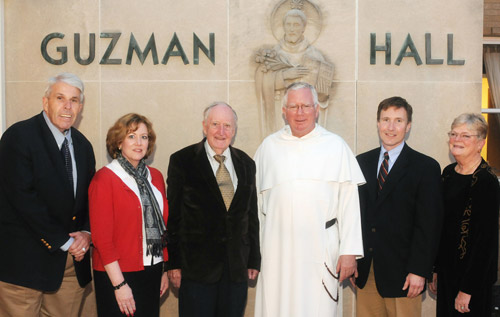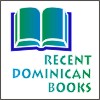 |
| Fr. Robert Christian, OP, with (from left) Harry Steinway, vice president for Student Affairs; Catholic and Dominican Institute advisory board member Robbie Bertola; Mount professor James F. Cotter, CDI director Charles Zola, assistant professor of philosophy; and CDI advisory board member Irene Nunnery. |
Mount Saint Mary College
Fr. Robert Christian presents lecture on Vatican II
NEWBURGH N.Y. – At Mount Saint Mary College’s Founders Chapel, theologian Fr. Robert Christian, OP, recently examined the impact of Vatican II with “The Church of the Second Vatican Council: A Work Complete, Yet Always in Progress.”
The free public talk, hosted by the Mount’s Catholic and Dominican Institute, marks the 50th anniversary of the Second Vatican Council.
Fr. Christian, who traveled from Rome, has worked at the Vatican, served in many administrative capacities in the Dominican community, and educated students from around the globe.
At the Mount, he enlightened listeners by exploring the meaning of Latin phrases such as “Ecclesia Christi subsistit in Ecclesia Catholica” from the Vatican II document “Lumen Gentium” and how the wording denotes both continuity and reform over the original expression, “Ecclesia Christi est Ecclesia Catholica.”
“The old word ‘is’ was not sufficient,” he emphasized. “‘Subsists in’ seemed to indicate more.”
He also discussed how ecumenical dialogue furthers the exploration of faith, making such dialogue vital to the Church’s continued growth and wellbeing.
That many elements of the Church can be found elsewhere gives grounds for common understanding. Fr. Christian used a comparison of ecclesiology to coffee: American coffee is about 99 percent water. Turkish coffee is about 99 percent coffee. “So, each recognizes one’s own faith in the expressions of the other, and appreciates one’s own faith.”
“These changes were profound,” said Fr. Christian. “They challenged prevailing ways of thinking. And we have not seen the end of the consequences of the Second Vatican Council.”
“We must not think of Vatican II as the gestation period that brought to birth a new Church, or a great song that sang the Church into being. Whatever is new with the council must be seen as organically connected to and flowing from the Church’s past,” he explained. “There is a constant validity of acts done by Christ that are not limited to his lifetime… words of the council were purposely chosen to indicate a change in the Church’s development.”
Vatican II significantly articulated the protocol of the Roman Catholic Church and its relationship with the modern world. Pope John XXIII convened the Second Vatican Council to “throw open the windows of the church so that we can see out and the people can see in.”
More than 2,500 Catholic bishops and priests participated. Invitations were also extended to Protestant and Orthodox Eastern churches and to male and female religious orders.
The Second Vatican Council discerned that increased lay participation in the liturgy necessitated celebration in local languages, instead of just Latin. The council also addressed religious freedom, the Church’s overall mission and many other issues.
Born and raised in San Francisco, Fr. Christian attended a Jesuit university. During his junior year in Italy, he lived in a Dominican parish.
“During that year I realized that God was calling me to priesthood in a contemplative and active religious order that prays the choral office and shares all things – even decisions – in common,” he said.
After graduation he entered the Dominican novitiate. He was ordained a priest in 1976.
Fr. Christian is now vice dean of the theology at the Pontifical University of St. Thomas Aquinas in Rome, has educated students from around the world, and serves as Consultor to the Pontifical Council for Promotion of Christian Unity.
The Catholic and Dominican Institute, directed by Charles Zola, assistant professor of philosophy, promotes the college’s heritage; advances the Dominican charism of study and service; provides a forum for discussion of contemporary ethical issues; and enhances Catholic and Jewish dialogue.
Guided by the college’s vision and mission statement, the institute welcomes persons of varied faiths and acknowledges different religious traditions as essential to the college’s intellectual and spiritual life.
The next Catholic and Dominican Institute event is a presentation by Nancy Marie Brown on Monday, Nov. 19 at 7 p.m. about her book “The Abacus and the Cross” in the Villa Library on campus, 330 Powell Ave., Newburgh, New York.
For more information about Mount Saint Mary College, visit www.msmc.edu.




